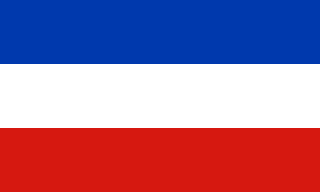
Schleswig-Holstein is the northernmost of the 16 states of Germany, comprising most of the historical duchy of Holstein and the southern part of the former Duchy of Schleswig. Its capital city is Kiel; other notable cities are Lübeck and Flensburg.

Southern Schleswig is the southern half of the former Duchy of Schleswig in Germany on the Jutland Peninsula. The geographical area today covers the large area between the Eider river in the south and the Flensburg Fjord in the north, where it borders Denmark. Northern Schleswig, congruent with the former South Jutland County, forms the southernmost part of Denmark. The area belonged to the Crown of Denmark until Prussia and Austria declared war on Denmark in 1864. Denmark wanted to give away the German-speaking Holsten and set the new border at the small river Ejderen. Prussian chancellor Otto von Bismarck concluded that this justified a war, and even proclaimed it a "holy war". He also turned to the Emperor of Austria, Franz Joseph I of Austria for help. A similar war in 1848 had gone poorly for the Prussians. With Prussia's modern weapons and the help from both the Austrians and General Moltke, the Danish army was destroyed or forced to make a disorderly retreat. And the Prussian-Danish border was moved from the Elbe up in Jutland to the creek Kongeåen.
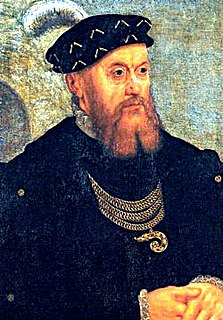
Christian III reigned as King of Denmark from 1534 and King of Norway from 1537 until his death in 1559. During his reign, Christian formed close ties between the church and the crown. He established Lutheranism as the state religion within his realms as part of the Protestant Reformation.

The Danish ethnic minority in Southern Schleswig, Germany, has existed by this name since 1920, when the Schleswig Plebiscite split German-ruled Schleswig into two parts: Northern Schleswig, with a Danish majority and a German minority was united with Denmark, while Southern Schleswig remained a part of Germany and had a German majority and Danish and Frisian minority populations. Their historic roots go back to the beginning of Danish settlement after the emigration of the Angles. One of the most common names they use to describe themselves is danske sydslesvigere.

The First Schleswig War or Three Years' War was the first round of military conflict in southern Denmark and northern Germany rooted in the Schleswig-Holstein Question, contesting the issue of who should control the Duchies of Schleswig and Holstein. The war, which lasted from 1848 to 1851, also involved troops from Prussia and Sweden. Ultimately, under international pressure, the Prussians had to withdraw their forces. As a result, the war ended in a Danish victory over the rebels and the signing of the London Protocol in 1852. A second conflict, the Second Schleswig War, erupted in 1864.
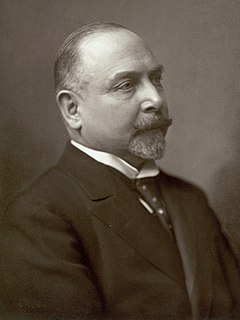
Carl Theodor Zahle, Danish lawyer and politician; prime minister of Denmark 1909–1910, 1913–1920. In 1895 he was elected member of the lower chamber of the Danish parliament (Folketinget), for the Liberal Party (Venstrereformpartiet). A campaigner for peace, in 1905 he co-founded the Social Liberal Party together with other disgruntled members of Venstrereformpartiet. He continued on as a member of the Folketinget for Det Radikale Venstre until 1928, when he became a member of the upper chamber of parliament (Landsting). In 1929 he became Justice Minister, a post which he held until 1935.
The Danish Scout Council is the national Scouting federation of Denmark. Scouting was founded in Denmark in 1909 and among the charter members of WOSM in 1920. Denmark has 40,813 Scouts.

The Scout movement in Germany consists of about 150 different associations and federations with about 260,000 Scouts and Guides.
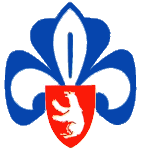
The Greenland Guide and Scout Association is the youngest of the Danish Scout associations, founded on February 2, 1973. Previously Greenlandic boys had belonged to one of the Danish Scout associations and girls belonged to one of the corresponding Danish Guide associations. Scouting in Greenland started in 1943, and Guiding began in 1950. Greenland Guide and Scout Association, however, is a coeducational organization, and has been recognized as an associate member of the Fællesrådet for Danmarks Drengespejdere since 1976 and of the Pigespejdernes Fællesråd Danmark since 1981. Initial grants from the Parliament of Greenland helped the fledgling organization. Today, the association has about 500 members.
Pigespejdernes Fællesråd Danmark is the national Guiding federation of Denmark. Danish Guiding started in 1910, the PFD was founded in 1923 and was among the founding members of the World Association of Girl Guides and Girl Scouts in 1928. The federation serves 18,893 Guides.
The Scout and Guide movement in Denmark consists of about ten different associations. Most of them are members of two large federations, but there are also some independent organizations. Affiliated to Danish Scouting and Guiding are the organizations in Greenland, on the Faroe Islands and in Southern Schleswig.

Jaruplund Højskole is the only Danish folk high school in Southern Schleswig, Germany and is located 10km south of the boarder in Flensburg. As a meeting point between to cultures, the school's programs focus on promoting greater understanding between the two nations and Europe at large.

The Isted Lion, German: Flensburger Löwe or Idstedter Löwe) is a Danish war monument originally intended as a monument of the Danish victory over German-minded Schleswig-Holstein insurgents in the Battle of Isted (Idstedt) on 25 July 1850, during the First Schleswig War which was a civil war within the Danish Realm, although with troops from Prussia supporting the Schleswig-Holstein insurgents. At its time it was the largest battle in Scandinavian history.

The Bund der Pfadfinderinnen und Pfadfinder (BdP) is the largest non-denominational, co-educational Scout and Guide association in Germany. Through its membership in the Ring deutscher Pfadfinderverbände and in the Ring Deutscher Pfadfinderinnenverbände, it is part of the World Organization of the Scout Movement and the World Association of Girl Guides and Girl Scouts. Founded in 1976, the association serves about 30,000 members nationwide.

The Danish Church in Southern Schleswig is an evangelical Lutheran church in Southern Schleswig in Northern Germany.

Denmark–Germany relations are the foreign relations between Denmark and Germany. Denmark has an embassy in Berlin and three general consulates in Flensburg, Hamburg and Munich. Both countries are full members of NATO and of the European Union. The border between the countries, which lies in the Schleswig region, has changed several times through history, the present border was determined by referendums in 1920. The Danish-German border area has been named as a positive example for other border regions. Substantial minority populations live on both sides of the border, and cross-border cooperation activities are frequently initiated.

Günter Weitling is a Lutheran theologian, historian, and author.
Southern Schleswig Danish is a variety of the Danish language spoken in Southern Schleswig in Northern Germany. It is a variety of Standard Danish (rigsmål) influenced by the surrounding German language in relation to prosody, syntax and morphology, used by the Danish minority in Southern Schleswig.
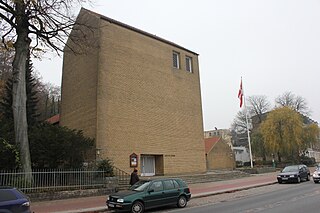
Ansgar Church (Danish: Ansgar Kirke, German: Ansgarkirche) is an evangelical lutheran church in northern Flensburg, Germany. Its congregation is the largest within the Danish Church in Southern Schleswig.















